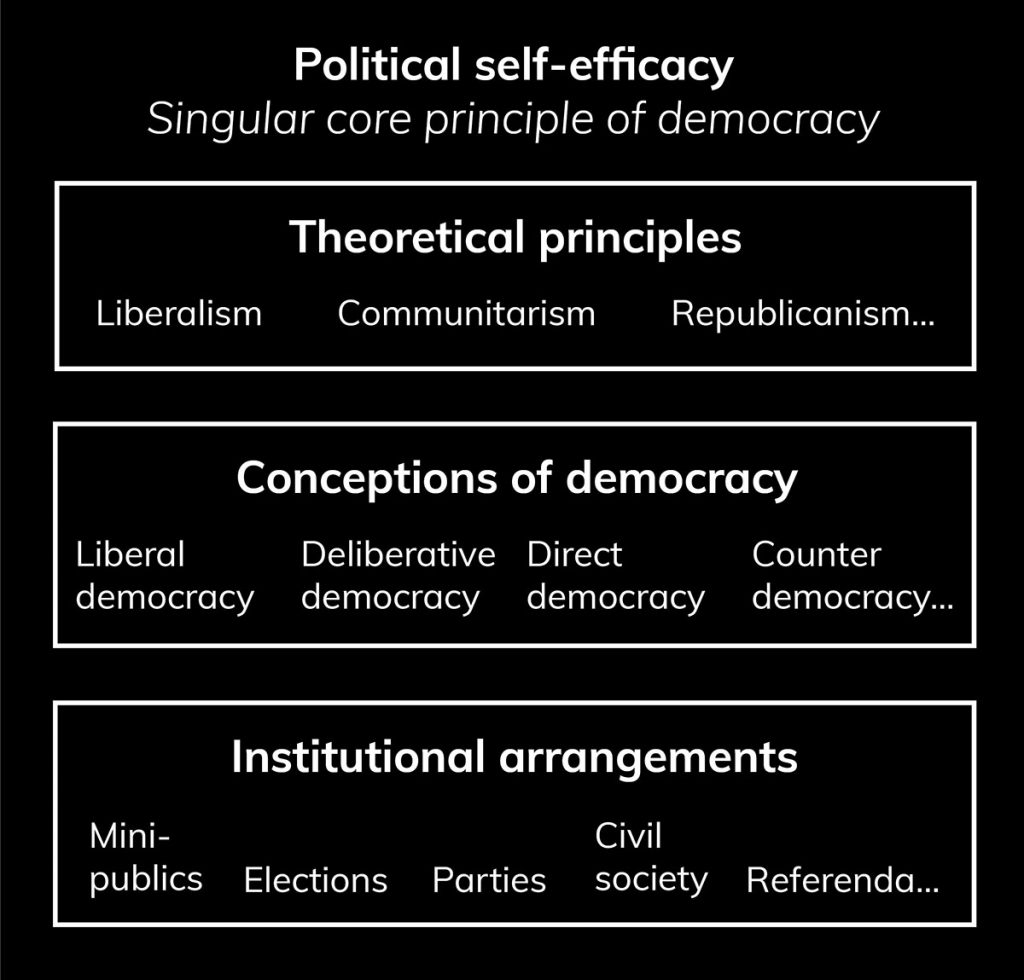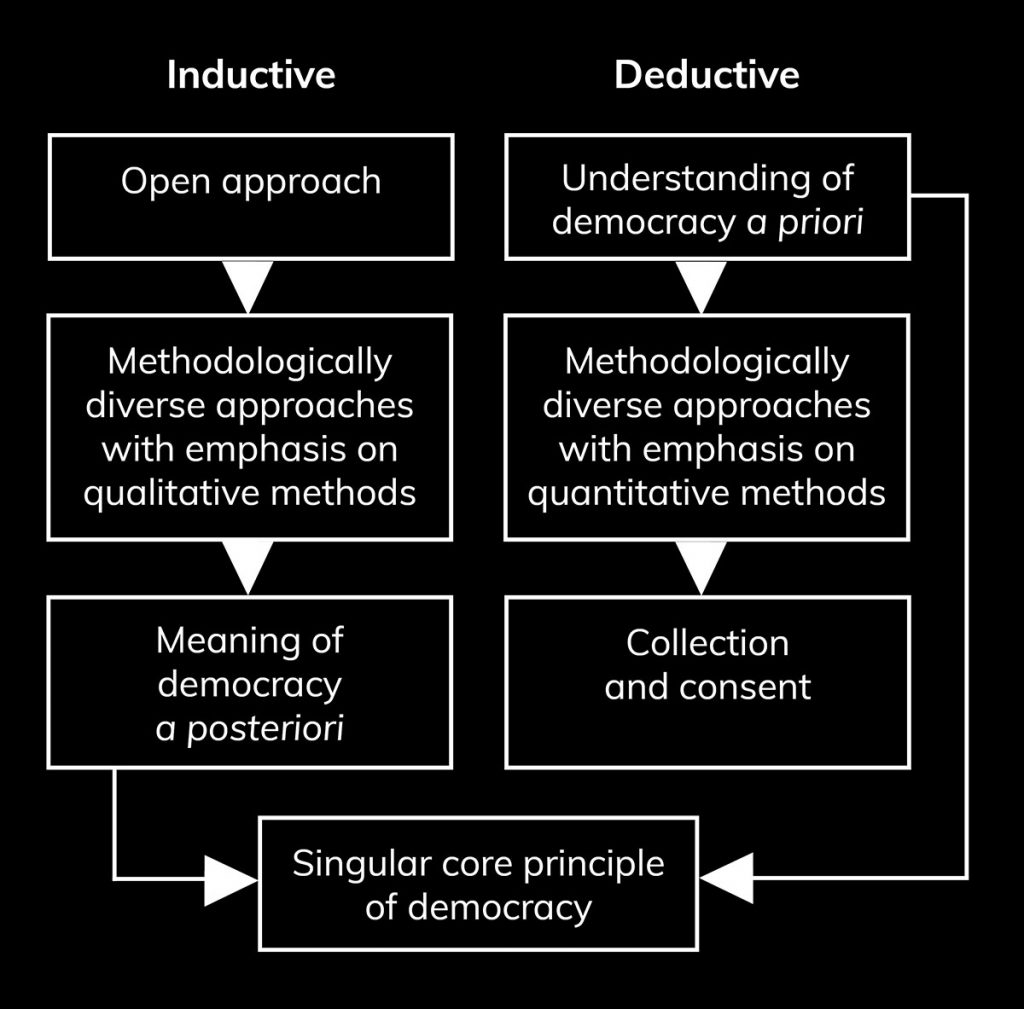Toralf Stark, Norma Osterberg-Kaufmann and Christoph Mohamad-Klotzbach elaborate on their proposal for a global concept of democracy. To do so, they move away from the institutional perspective to identify a normative good of democracy, to which they refer as the singular core principle: political self-efficacy
Jean-Paul Gagnon taught us how full the world is of terms that describe a political system as democratic. We find these terms in different notions, languages and cultures. From a theoretical point of view, a normative added value then results from the blending of these terms and their associated conceptions.
It is therefore our task to identify these conceptions of democracies. We collect them, study them and present them to a broader audience. Nevertheless, how do we sort through this library of democratic ideas to identify the normative good, or, as we call it, the singular core principle that emerges from the blending of these conceptions?
Many criticisms of conceptions of democracy are directed more at the institutional design than at its normative underpinnings. These include such things as the concept of representativeness. We propose focussing more on the normative foundations assessed by the different institutional frameworks than discussing the institutional frameworks themselves. We develop a new concept, which we call the 'core principle of democracy'. By doing so, we address the conceptual and methodological puzzles theoretically and empirically. Thus, we embrace a paradigm shift.
Collecting data is ultimately meaningless if we do not find ways to assess, summarise and theorise it. Kei Nishiyama argued we must 'shift our attention away from the concept of democracy and towards concepts of democracy'. By the term concept we, in line with Nishiyama, are following Rawls. Rawls claimed that 'the concept of democracy refers to a single, common principle that transcends differences and on which everyone agrees'. In contrast with this, 'ideas of democracy (…) refer to different, sometimes contested ideas based on a common concept'. This is what Laurence Whitehead calls the 'timeless essence of democracy'.
Democracy is a latent construct and, by nature, not directly observable. Nevertheless, we are searching for indicators and empirically observable characteristics we can assign to democratic conceptions. However, by focusing only on specific patterns of institutions, only sometimes derived from theoretical considerations, we block our view of its multiple meanings. Thus, we've no choice but to search behind the scenes for the underlying 'core' principle the institutions serve.
The singular core principle that all concepts of democracy seek to realise is political self-efficacy
From an empirically oriented or so-called bottom-up perspective, we find this core by starting from the empirically observable institutions in a particular country. We then climb the ladder of abstraction and ask for the principles behind them. Thus, the common underlying principle is what we find there. This is so regardless of whether that principle is implemented; for example, through the concept of liberal or deliberative democracy.
We recognise that our Western perspective shapes our proposal. However, we conclude, preliminarily, that proceeding from the liberal, communitarian and deliberative perspective, the singular core principle that all concepts of democracy seek to realise is political self-efficacy.

Another perspective is more theoretically, top-down oriented. To achieve this, we take the conviction of political self-efficacy as the singular core principle of democracy. With this in mind, we examine various theoretical principles to identify how they aim to realise this singular core. Our individual findings allow us to generate new conceptions of democracy, as if from a construction kit, for which different institutional arrangements are required. This reading allows us to design new models of democracy with new institutions whose names we do not yet know.
The search for the core of democracy must therefore be expanded. Ultimately, it must be permanently verified through a variety of methodological approaches in an interplay of inductive and deductive methods; around non-Western perspectives, for example. The inductive approach, as an open approach, starts from a certain set of observable facts or ideas. From here, it forms a general principle and aims to generate different meanings of democracy. To this end, it makes use of methodologically diverse approaches with a focus on qualitative methods. Using the deductive approach, we can measure existing understandings of democracy. Together with the meanings, we can create the most credible picture of a singular core principle of democracy.

To sum up, the paradigm shift we aim to stimulate cannot simply consist of saying that liberal democracy is no longer the (unspoken) ideal to which we aspire, including the principle of representation and free and fair elections as the core of democracy. Neither does the paradigm shift mean imagining deliberative democracy as the ideal democracy and then measuring everything that wishes to label itself democracy in the future based on whether there are deliberative participation formats.
Our paradigm shift is to step back behind the institutional perspective and ask: what purpose do these institutions serve?
The paradigm shift is to step back behind the institutional perspective and ask what purpose these institutions serve. What is the underlying core principle of all democracies, regardless of their type and form? What do they attempt to realise with their diverse institutions?
Which ideas of democracy and institutions, moreover, best do justice to this basic principle? That depends on the fundamental perspective on the organisation of societal interests.
If we explain the world with a republican, communitarian, or even liberal logic, it is different processes or institutions that help to realise the core principle of democracy in the best possible way. This, in turn, results in different conceptions of democracy, which may include representative democracy, direct democracy, deliberative democracy, and so on.
Such an approach, in all its diversity, is, ultimately, a singular conception of democracy. At the same time, it is open to the decentralisation of democratic scholarship, and flexible enough to reflect innovations and future conceptions of democracy.
Number 55 in a Loop thread on the science of democracy. Look out for the 🦋 to read more in our series